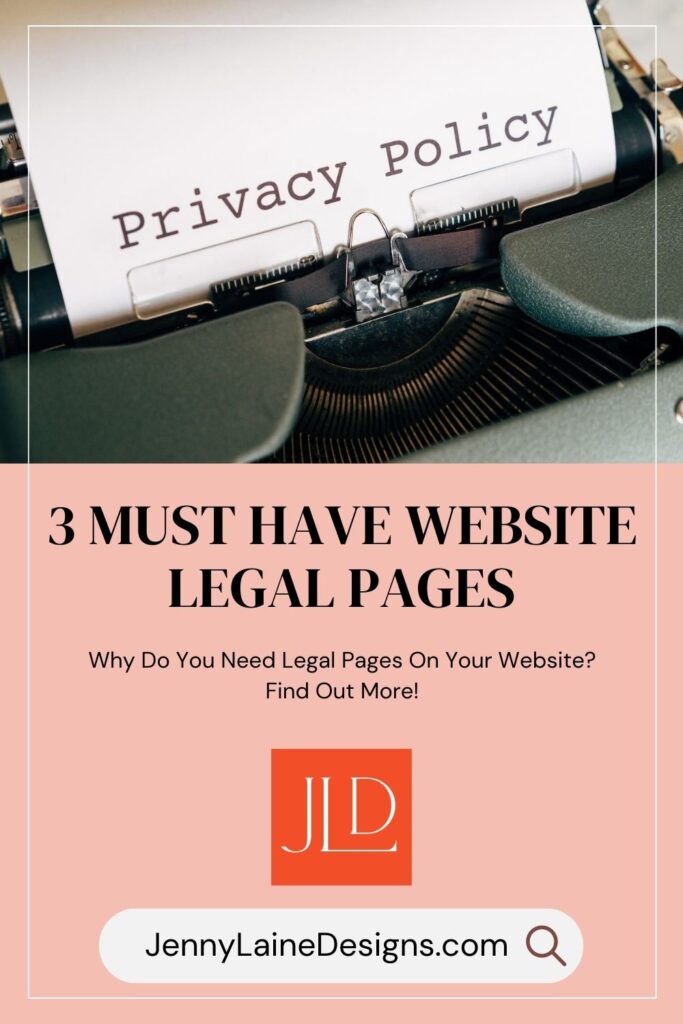Often as web designers, we focus on design, content, and user experience. Yet, there’s an equally important aspect that often flies under the radar – legal website disclaimer pages. These pages might not be the most thrilling part of your website, but they are essential for safeguarding your online business. Let’s dive into why having legal pages is a must, and how they can protect both you and your users.

Why Do You Need Legal Pages?
1. Protection Against Legal Disputes
Legal pages, such as Privacy Policy, Terms of Use, and Disclaimer, act as a barrier against potential legal conflicts. They lay out the ground rules for interactions on your website, protecting you from liabilities that could arise from user actions, content, or transactions.
Terms of Use – This is your contract with website visitors
Your terms of use tell visitors how they can behave; what kind of comments they can post; any user account policies; explain your refund and payment policies, protect your intellectual property; and spell out how and where any disputes are handled. Most importantly it disclaims liability for the information and products on your website.
Privacy Policy – legally required
If you have a website, you need a Privacy Policy, which tells your website, visitors, how their data is being stored and shared. You’re legally required to have one if you’re collecting personal info from anyone in the EU or California, or if you run Google or Facebook ads, or use Google Analytics.
Affiliate Disclaimer
Including an Affiliate Link Disclaimer on the website is highly significant. It’s akin to maintaining transparency in a relationship. This disclaimer informs visitors about specific links that could generate income for the website if purchases are made through them. Importantly, these links do not impact your website’s genuine intent in sharing valuable information. The website remains committed to delivering accurate and beneficial content. The disclaimer’s purpose is to ensure everyone is well-informed. It’s akin to saying, “We’re upfront with you!” This practice reinforces trust and strengthens the bond between the website and its visitors.
2. Create User Trust
Transparent legal pages build trust with your visitors. When users see that you’re upfront about your website’s policies, they’re more likely to engage with your content, make purchases, or share their information with confidence.
3. Compliance and Fines
Numerous jurisdictions require specific legal information on websites. Neglecting these requirements can result in significant fines. Proper legal pages ensure that you’re compliant with the relevant regulations, giving you peace of mind.
4. Safeguard Your Creations
Copyright notices and intellectual property disclaimers protect your original content from being misused without your permission. They help maintain the integrity of your creative work.
5. Data Privacy Assurance
In an age of heightened data privacy concerns, a well-crafted Privacy Policy assures users that their data is handled responsibly. This can aid in complying with regulations like GDPR and CCPA, fostering user confidence.
How to Create Effective Legal Pages
1. Do Your Research
Understand the legal requirements applicable to your industry and location. This knowledge will guide you in drafting accurate and comprehensive legal pages.
2. Utilize Templates
Numerous online resources provide legal page templates. While it’s essential to tailor them to your specific needs, these templates can be a great starting point. I have three great resources below.
3. Seek Professional Help
If legal jargon leaves you scratching your head, consider consulting a legal professional or utilizing services specializing in generating legal pages.
Your website is more than just a digital space – it’s a reflection of your brand and expertise. By establishing strong legal pages, you’re not only protecting yourself from potential legal hassles but also building trust with your audience. Don’t underestimate the importance of these often-overlooked pages. They play a vital role in ensuring your online venture thrives securely and responsibly.
Remember: Your website’s legal pages are your digital armor – don’t venture online without them!
Website Legal Disclaimer Policy Page Options
Bonus: If you sign up for my premium maintenance plan with Jenny Laine Designs, you will receive a free Termageddon set of Policy Pages for as long as you keep your care service package with Jenny Laine Designs. However, whether free or paid, you are responsible for filling out the information and returning it to Jennifer for your website. All Jenny Laine Designs websites include legal pages and are referred to in the contract we both sign. Don’t worry if you aren’t building your website with me. These recommendations are great for anyone with a website. 🙂
3 of my most preferred options:
Disclaimer: I am an affiliate for each of these companies only because I have used them, have clients that have used them or they came highly recommended (or all three). You don’t pay any more than you normally would and I will receive a small % of the sale. I take the legal side of your website seriously because I want you to stay protected.




Share This Post